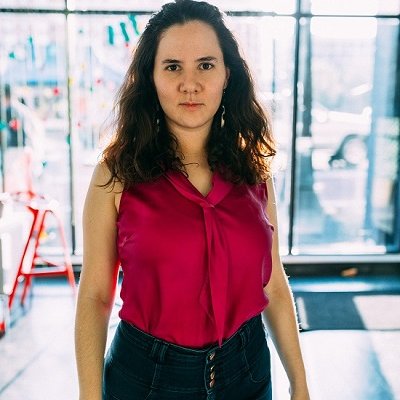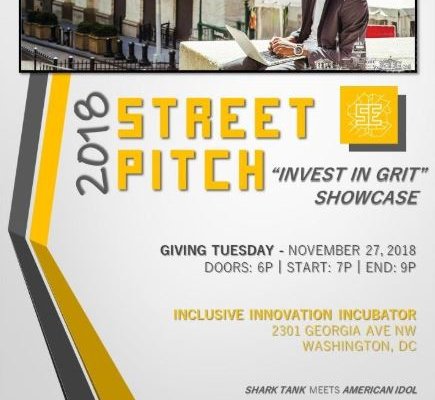- What is Street Entrepreneurs origin story?
In 2015 Juliana Cardona founded Street Entrepreneurs to provide entrepreneurial education to disadvantaged youth, with classes in shelters and prisons. At community centers, different groups attended, including 50+ unemployed individuals, mothers with special needs children that required they work from home, and underemployed individuals. This observation helped Street Entrepreneurs expand its services to focus on diminishing barriers to accessing entrepreneurship. Street Entrepreneurs supports problem solvers with grit and a good idea launch to scale their enterprises, thus building wealth for themselves, their families, and communities.
Street Entrepreneurs looks for people with talent, hope, and heart where others overlook, and creates human, social and economic development, locally. Businesses Street Entrepreneurs has supported include: a low-carbon footprint high-heel shoe, helping kids with autism communicate using artificial intelligence, and a catering company, which hires and gives back to veteran organizations. Street Entrepreneurs hosts 35 classes for over 300 entrepreneurs per year.
- Tell us about the role of “grit” in your mission. What does grit mean to you personally? What exactly is the “grit-based economy” and how is it connected to greater access and equity for entrepreneurs?
We define grit as something that keeps you up at night and wakes you up in the morning. Grit pushes you to see how far you can go. It tests your agility and ingenuity. It forces you to question the status quo. If you have grit everything else can be learned. When you join our program the only requirement we make is GRIT. There are no applications and all costs associated with the program are based on each individual’s discretionary income. All we ask is that participants show up to workshops and prove, over the course of a year, they have what it takes to become a Street Entrepreneur – we call this process a “grit funnel” where only the most driven founders are selected for the “Street Pitch Showcase”.
Personally, I believe in the pursuit of a more just world where those who are deserving can benefit from the economy. A world where if you are willing to work hard you can provide for your family. Unfortunately, that is not the world we live in. You can work a full-time job and still not make enough to feed your kids, never mind retire. That is where entrepreneurship can come in as a possible solution to income inequality and unemployment. Street Entrepreneurs exists to eliminate all barriers that impede innovation and ethical business creation. We provide dedicated founders everything they need to make it (that is – everything but grit). We create access to knowledge, connections, and capital. If they need know-how, we offer 32 “pay-what-you-can” workshops. If they need connections, our community steps in to make them. If what they need is seed capital, we invite them to “Street Pitch” – where they can presale their products/services and raise equity/debt investments for their respective business.
- Tell us more about your “Talent Exchange” program. How does it work? How do you inspire and encourage entrepreneurs to trade their knowledge and skill sets? What have the results been?
Our talent exchange creates a sustainable ecosystem where entrepreneurs can help one another without existing capital. The talent exchange is a simple yet powerful idea that allows participants to barter skills and training with other community members, thus enabling them to grow their network and connect to mentors, coaches, prospective team members, and fellow entrepreneurs. In this exchange, the currency is shared time and talent. Exchanges occur locally within the community. For example, let’s say you are a data scientist trying to create a plug in that would allow small e-commerce sites to customize their offering to each user, and you need a coder to help you bring this dream into reality. You would donate your time to helping other entrepreneurs in the community applying data science in their enterprise and receive time credits. You can then exchange time credits to get help from a coder. The more scarce the resource the higher the value of the credits received. We also gamify and incentivize merit by providing more credits per time to those who consistently deliver quality support. The talent exchange has been functioning informally and without technology for about a year. Our talent exchange was recognized as an example of building an inclusive ecosystem in Beacon DC’s recent report. The tech enabled version of the talent exchange is called the “Talent Hive” and has been in beta testing for about 2 months.
- Tell us about the role of community partnerships and volunteers in your work. Do you have any advice on how to build partnerships that are meaningful and long lasting?
We are a grassroots solution to systemic problems getting in the way of an entrepreneur’s success. The only way our work will be sustainable is by creating a community networks that can outlive our funding. We are dependent on approximately 120 rotating volunteers and organizers. Our growth strategy consists of the creation of local chapters. It takes about 20 volunteers to initiate a chapter. In 2019, we are looking to create chapters in post-industrial American cities and are looking to create partnerships with foundations, companies, donors, and volunteers who want to bring us to their city. At the core of my belief as the founder of Street Entrepreneurship is collaboration. If you want to go fast you go alone and if you want to go far you build a coalition. We want to create a structural change to the economy and thus we need to collaborate with advocates such as the Institute for Justice who is working to make business licensing affordable and the Inclusive Innovation Incubator (In3) working to support black technologist and entrepreneurs.
My advice to building meaningful partnerships is to treat them as you would dating. Leave your check-lists and agendas at home and be open to getting to know the “why” of those who work in the partner organization(s). If your values align, join forces to go further. What I believe often gets in the way of collaboration is ego – who will get the credit. If you are willing to let go of that mentality you will be more efficient at accomplishing your mission. As far as I am concerned, I could care less who gets the credit so long as makers are able to make it.
- What does a typical workday look like? Do you have a daily routine or ritual that you swear by / that helps you stay focused as you build your nonprofit?
- I check emails as soon as my alarm rings and flag those that are priority. I typically answer correspondence from current participants first and media requests last.
- Get ready and bike to work. I use this time to clear my mind and meditate. During my commute I remind myself why I do what I do. I think of all the people that I am working hard for and give thanks for those who make it possible.
- I start the day with a morning meeting with everyone in the SE team. I work with 5 to 10 full-time fellows per semester. These volunteers come from all over to learn of SE’s operations and many go on to start chapters in their home countries. I try to start by focusing on our team’s common reason for doing the work we do. Our team is fueled by something more valuable than money so reigniting passion daily is key. I then go on to set priorities – tying each of the priorities to our “why” (reasons for doing the work we do).
- I typically have 3 to 8 meetings per day with entrepreneurs and partners.
- We check out at 5 pm. During check-outs each person reports on how they are doing both personally and professionally. I don’t believe in managers, I believe in self-driven team-leads. Each person is the lead for a particular project and during check-outs they update the team on progress.
- I stay behind until 7 or 8 pm doing individual work – grant writing, volunteer coordination, workshop planning, connecting entrepreneurs to mentors/coaches…etc.
- I try to minimize decision making and eat premade meals for breakfast, lunch and dinner. I typically have all my meals in the office.
- When I get home, I take about an hour break to get ready for bed and around 9 pm begin to follow-up on correspondence. This can go on until 12 / 2 am.
- I do this about 4 times a week, Friday I work from home and do off-site meetings. On Saturday I try to limit my work to 3 hours and Sunday I focus on planning the week (which can take up to 5 hours).
As I am writing my routine I have to admit that there is a more desirable routine I hope to adapt in the new year. While I am good at insisting my team takes time to restore and rest, I often don’t do the same for myself. I feel the urgency to work because the faster I work the more people we can help. I recognize that my current routine leads to burn out via sickness. I am striving to create a more balanced life – because for Street Entrepreneurs to be sustainable I need to be well. So this coming year I am committing to lowing the number of hours I spend working from 80 to 60. Ideally, I would like to reserve more time during my 9 to 5 for independent work and personally I would like to eat only 1 meal in front of the computer. I am also trying not to work on the weekends and make time for yoga and friends.
- Do you have a favorite quote or mantra that inspires you?
The song Servant of Peace I play on repeat when I feel tired. The lyrics are made up of the Saint Francis of Assisi prayer:
“Lord, make me an instrument of Thy Peace; Where there is hatred, let me sow love; Where there is injury, pardon; Where there is doubt, faith; Where there is despair, hope; Where there is darkness, light; Where there is sadness, joy.
Oh Divine Master, grant that I may not so much seek, to be consoled as to console; To be understood, as to understand; To be loved, as to love; For it is in giving that we receive, it is in pardoning that we are pardoned, it is in dying that we are born into eternal life.”
Learn more here:
https://www.facebook.com/StreetEntrepreneurs/
https://www.streetentrepreneurs.org/





